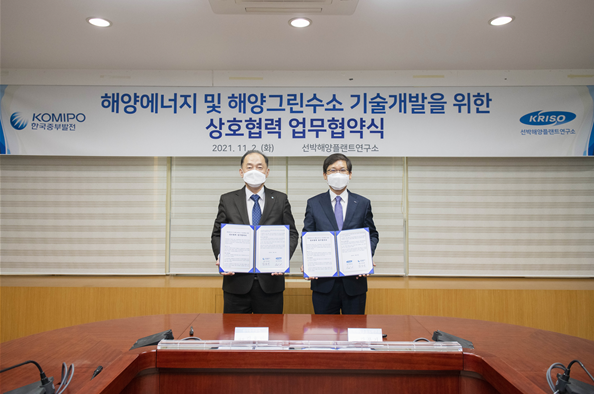
□ The Korea Research Institute of Ships and Ocean engineering (KRISO, led by President Booki Kim) announced that it has signed an MOU with Korea Midland Power Co.,Ltd. (KOMIPO) on November 2nd for the joint development of marine energy such as wave power and green marine hydrogen technology to meet the goal of carbon neutrality by 2050.
□ The MOU signing ceremony was held at KRISO, and attended by President Booki Kim of KRISO and KOMIPO CEO Hobin Kim.
□ This MOU was formed to respond to Korea’s energy transition strategy, such as the 2050 carbon neutrality goal and the Korean New Deal, which is driving a rapid rise in demand for renewable energy, by developing technologies for marine energy and green hydrogen, two fields in which long-term growth is projected.
□ KRISO and KOMIPO will cooperate on developing and commercializing wave power and green marine hydrogen technologies to promote the expansion of the hydrogen economy, with plans to utilize the technologies in spin-off businesses and programs.
□ Marine energy refers to electricity or heat generation using ocean waves, currents, thermal differences, and tides. Assessments of Korea’s marine energy resources range from a theoretical 440GW to a technical 100GW. Associated technologies are at an advanced level of development based on empirical research.
□ Green marine hydrogen refers to hydrogen produced based on marine renewable energy, and growth in demand is expected as power systems incorporate marine renewable energy to achieve carbon neutrality. Marine energy and green marine hydrogen technologies are crucial for achieving carbon neutrality. Green marine hydrogen is expected to be used to supply energy not only to land-based applications, but also to hydrogen fueled vessels and energy independent islands.
□ Currently, KRISO leads technological developments in marine energy such as wave power through empirical research, and is working on core technology for green marine hydrogen production based on this expertise. KOMIPO has established a basic plan for marine energy to build a foundation for the development and distribution of marine energy to expand its renewables portfolio alongside wind and solar power in response to Korea’s carbon neutrality policy.
□ KRISO President Booki Kim commented, “As Korea’s leading research institute in ships and ocean engineering, KRISO will use this MOU as an opportunity to lead technological developments in marine energy such as wave power and green marine hydrogen, support the programs of a public electricity company and contribute to achieving the goal of carbon neutrality.”

 Research Project
{{data.S ? data.S.sum : 0}}
Research Project
{{data.S ? data.S.sum : 0}}

 Patent
{{data.P ? data.P.sum : 0}}
Patent
{{data.P ? data.P.sum : 0}}

 Technology Transfer
{{data.T ? data.T.sum : 0}}
Technology Transfer
{{data.T ? data.T.sum : 0}}

 Thesis
{{data.R ? data.R.sum : 0}}
Thesis
{{data.R ? data.R.sum : 0}}










